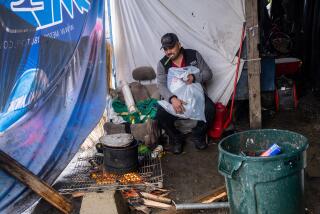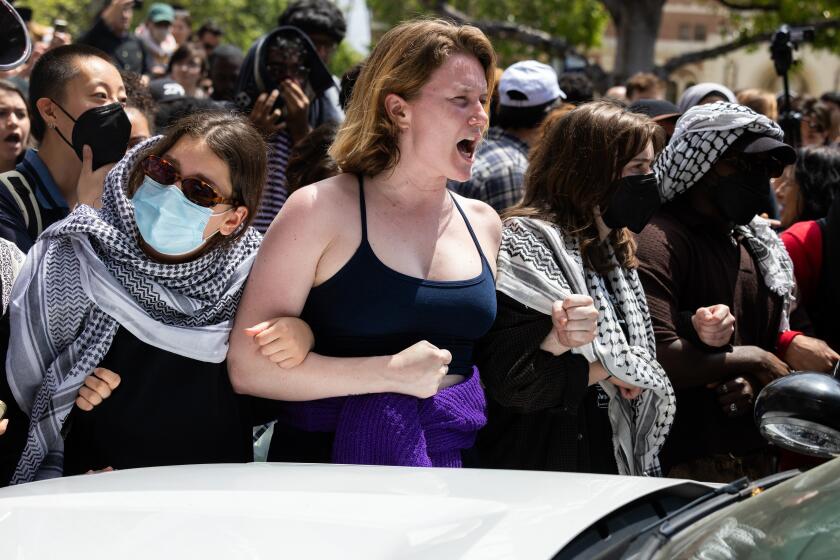Will UC buy into the ‘new’ King?
It still doesn’t have a name. But this week, L.A. County will try to sell the University of California Board of Regents on a plan to create a UC-supervised entity to run a new incarnation of the Martin Luther King Jr./Drew Medical Center.
The media has described the proposed 320,000-square-foot facility in South Los Angeles as a “replacement” for or the “reopening” of the old medical center. Although it would be on the same site, it would be neither -- and that is a good thing.
UC is being asked to operate a new, independent entity that would recruit, hire and supervise a staff of about 400 medical people, including up to 50 doctors, for what county officials are calling a private, nonprofit hospital and clinic. This is a major departure from the county’s practice of operating its public hospitals within its massive Department of Health Services bureaucracy.
County officials claim that federal, state and county fee reimbursements would cover the estimated $200-million annual operating costs. They say the state-of-the-art hospital could do a far better job of providing healthcare than its predecessor. “It’s modern and technology driven,” says County Supervisor Mark Ridley-Thomas, a critic of the old King-Drew who strongly backs the new hospital plan.
The facility would be different in several other important ways.
It would be much smaller, with less than a third of the old hospital’s 400-bed capacity and only 20% of its 2,000 personnel. It wouldn’t have a full emergency room or a trauma center; local activists have demanded both. A study published in 2008 found that the alternate trauma care center at Harbor-UCLA Medical Center, while 10 miles away, is treating serious cases better than the old King-Drew trauma center did.
Instead, the new facility would have an emergency department and an urgent care center. More important, it’s to have a new “major ambulatory care center.” Clearly, the intention is to give the clientele proactive medicine, focused on preventive care instead of midnight ER visits. The shrinkage from 400 to 120 beds also confirms that the new King would be refocused on outpatient care. Less obstetric and neonatal patient care would be offered, because most such patients are covered by Medi-Cal and already go to private hospitals.
Instead of trying, like its predecessor, to be a landmark treatment and research center, the new facility would offer basic, quality community medicine. Some will say it’s about time.
But as the UC hearing approaches, important questions remain. Could a new and untested private, nonprofit hospital entity, working with the university and the county, do a better job than the county’s health department? Would the new hospital be able to accommodate medical students from the orphaned Charles R. Drew University of Medicine and Science, which was linked with the old hospital and supplied residents to it? And would the UC system, already beset by budget cuts, be able to stretch its resources to take on this new, unproven endeavor -- even if, as the county has repeatedly claimed, the operating and staffing costs would be covered by federal, state and county money?
In the meantime, the county supervisors have asked the contractor to move ahead on an initial $20-million phase, even before the regents’ hearing. This was in order to lock in financing via long-term federal bonds. The ultimate building cost -- which also involves renovation of some of the old buildings and demolition of others -- is reported to be more than $330 million. And if it comes through, the county’s plan would be bolstered by pharmaceutical magnate Patrick Soon-Shiong’s $100-million guaranty to the regents to underwrite the proposal. But it’s not clear what happens if UC says no. Or why it is obliged to say yes.
“The UC system is a powerful statewide public institution that shares the county’s mission to serve the poor and indigent,” said Supervisor Zev Yaroslavsky. But UC’s mission, according to the 1960 Master Plan for Higher Education, is to educate the top tier of the state’s students and foster research. Its past arrangements, whereby UCLA medical students train at and serve internships and residencies with the county’s Harbor and Olive View hospitals, benefited both parties. Even if the county can cover its costs, it’s not yet clear what net benefit UC might get from operating the new King.
Meanwhile, UC faces its worst financial crisis in memory, with savage cuts in recruitment, enrollment and salaries, along with proposed stiff increases in admissions fees.
After three decades of allowing King-Drew’s decline, the Board of Supervisors has scant right to demand that the state’s university reverse the county’s systemic failure. It can only ask politely -- and hope.
More to Read
Start your day right
Sign up for Essential California for news, features and recommendations from the L.A. Times and beyond in your inbox six days a week.
You may occasionally receive promotional content from the Los Angeles Times.






